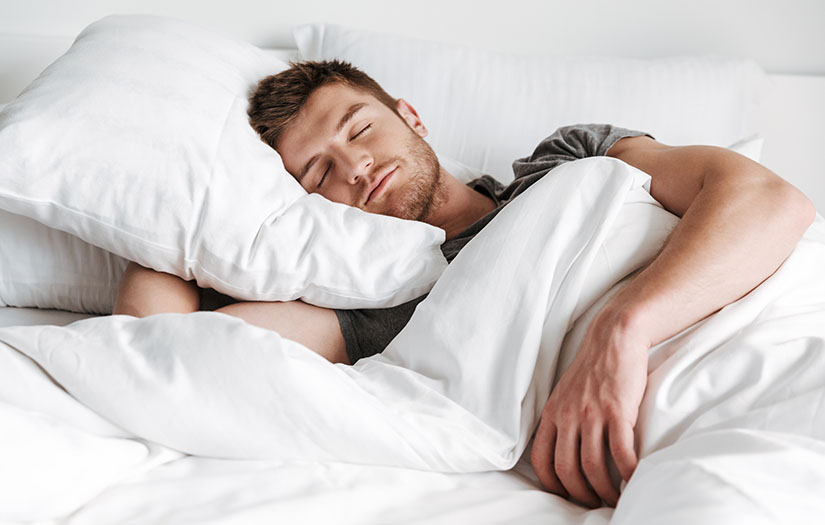According to the Center for Disease Control, the National Sleep Foundation, and the American Academy of Sleep Medicine, our nation’s sleep debt is an increasingly pervasive problem.
The industry of sleep medications, supplements, mattresses, and products far exceeds a billion dollars. But even if you have gotten a sleep study and do not have a sleep disorder, this does not mean you are automatically set up to have a restorative night of sleep.
Sleep is so important that NASM devoted a whole chapter (chapter 14) to explaining its significance in their Wellness Coach certificate.
Top 9 Reasons Why You Can't Sleep
1. Phones. Phones emit blue light which blocks the release of melatonin: the hormone that helps us fall asleep and stay asleep. Put your phone down at least an hour before bed.
2. TV in bed. TVs also emit blue light. Watching TV also conditions the brain to think that the bed is for something else besides sleep. And it’s not.
3. Social media. Even if you wear blue-light blocking glasses or have a blue-light filter on your phone, hype videos on TikTok are highly disruptive. The videos trigger a brain state of excitement which will make sleep much more difficult.
4. Too hot or too cold. Temperature drives sleep and wake states. If we sleep in a room hotter than 72 degrees (and have tons of blankets in addition to pajamas) or cooler than 66 degrees, we stress our thermoregulatory (temperature-sensitive) system. The result is wakefulness.
5. Too much noise outside. Have you ever felt like you get the best night of sleep in a cabin or at a retreat? It’s because you don’t have the noises of the modern world. If you live in a city or have disruptive bed partners, children, or neighbors, you may want to consider a sound machine.
6. Too much sugar before bed. Grandma and mom were right. Sugar before bed spikes blood glucose levels making it more difficult to fall asleep.
7. Too much alcohol. Alcohol may help you sleep like a baby, at first, but as soon as that alcohol is metabolized, good luck trying to fall back asleep.
8. Doing a high-intensity workout too close to bed. Brisk walking or sweating is fine but getting our heart rates and subsequent core body temperatures above 70% maximal effort two hours before bed isn’t helpful for sleep. You may fall asleep easily due to exhaustion, but you’ll likely wake up.
9. Anxiety. There’s a reason why the best piece of marriage advice is to never go to bed angry. Your sleep will suffer. Strong emotions of any kind and independent of any relationship impacts sleep.
How to Clear Your Mind for Sleep in 8 steps:
1. Phone in the kitchen. In addition to putting your phone down at least an hour before bed, keep your phone in the kitchen. One reason is that out of habit you aren’t looking at the clock when you wake up in the middle of the night. We all wake up at least once or twice in the middle of the night. It’s a natural process but usually, we fall back asleep in a few minutes. A phone on your bed stands dually serving as an alarm clock disrupts this natural process.
2. Watch TV and read in the living room. Don’t train your brain to think that the bed is for anything else but sleeping.
3. Stop social media after dinner. Don’t let hype videos disrupt your sleep. Quality time with family or relaxing activities after dinner can help psychologically prepare us for a night of restorative sleep.
4. Keep the room between 66-72 degrees. Fortunately, the range is broad. We understand increasing energy costs are a bear. If you can’t achieve this range, invest in a cooling pad instead. Ten cents a day for years of restorative sleep is worth the investment.
5. Buy a sound machine. Some noise frequencies such as pink noise even catalyze a system in your brain that helps reduce sleep fragmentation in addition to canceling background noise.
6. Replace a nightcap with a nighttime tea. Many caffeine-free teas have chamomile which is found to be sleep-promoting.
7. Do yoga—not HIIT—before bed. Save your high-intensity workouts for the morning or mid-afternoon. The few hours right before bed should be just as restorative as sleep, itself.
8. Breathe and stay calm. Anxiety is the #1 driver of poor sleep. Finding healthier coping mechanisms is as easy as breathing. The box method (a four-second count of breathing in, holding it, and breathing out) can make all the difference, activating a parasympathetic (relaxing) response.
Check out 7 ways to reduce stress through mindfulness - if you want even more relevant tips for calming your mind.
How DOes Sleep Connect With Wellness?
Sleep is a complex process, but it is also a multi-functional process. There is no single universal function of sleep. Sleep builds muscle, removes wastes, replenishes energy stores, refines learning and memories, and re-sets busy neural pathways. Sleep also helps us regulate mood.
Wellness encompasses all these states: physical, mental, emotional, and spiritual. Without adequate or restorative sleep, we can’t enter a state of wellness. This creates a vicious cycle of trying to make up for lost sleep quickly and constantly, a self-defeating endeavor. So, sleep and seize the day!
Summary:
Sleep is a very complex process that engages many systems and biochemical pathways. The balance between wake-promoting and sleep-promoting pathways is also precarious. Too much of one neurochemical such as glutamate can transition an otherwise deep sleeper quickly into a state of sustained wakefulness.
From an evolutionary perspective, sleep is a very dangerous state to be in (“out in the wild”) so there is a reason why this state is rapidly reversible. Here, we break down ten broad reasons why people can’t sleep and ten more on how to get and stay asleep.
















